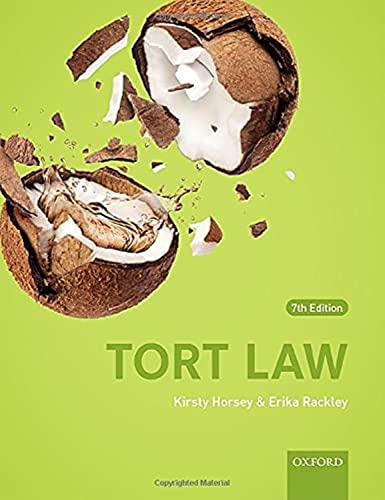Question
Rodgers v. McCullough 296 F.Supp.2d 895 (W.D. Tenn. 2003) This case concerns the Defendants' receipt and use of Christine Rodgers' consumer report. Ms. Rodgers gave
Rodgers v. McCullough
296 F.Supp.2d 895 (W.D. Tenn. 2003)
This case concerns the Defendants' receipt and use of Christine Rodgers' consumer report. Ms. Rodgers gave birth to a daughter, Meghan, on May 4, 2001. Meghan's father is Raymond Anthony. Barbara McCullough, an attorney, represented Mr. Anthony in a child custody suit against Ms. Rodgers in which Mr. Anthony sought to obtain custody and child support from Ms. Rodgers. Ms. McCullough received, reviewed, and used Ms. Rodgers' consumer report in connection with the child custody case.
Ms. McCullough instructed her secretary, to obtain Ms. Rodgers' consumer report. She reviewed the report in preparation for her examination of Ms. Rodgers during a hearing. She also used the report during the hearing, including attempting to move the document into evidence and possibly handing it to the presiding judge.
The dispute in this case centers around whether Ms. McCullough obtained and used Ms. Rodgers' consumer report for a purpose permitted under the Fair Credit Reporting Act (the "FCRA"). Plaintiff contends that Ms. McCullough, as well as her law firm, Wilkes, McCullough & Wagner, a partnership, and her partners, Calvin J. McCullough and John C. Wagner, are liable for the unlawful receipt and use of Ms. Rodgers' consumer report in violation 15 U.S.C. 1681o (negligent failure to comply with the FCRA) and 1681n (willful failure to comply with the FCRA or obtaining a consumer report under false pretenses). Plaintiff has also sued Defendants for the state law tort of unlawful invasion of privacy.
Plaintiff has moved for summary judgment on the questions of whether Defendants failed to comply with the FCRA (i.e. whether Defendants had a permissible purpose to obtain Ms. Rodgers' credit report), whether Defendants' alleged failure to comply was willful, and whether Defendants' actions constituted unlawful invasion of privacy.
The United States Court of Appeals,W.D. Tennessee GRANTED Plaintiff's motion for partial summary judgment on the question of whether Defendants had a permissible purpose to obtain Ms. Rodger's credit report. It DENIED Plaintiff's motion for summary judgment on the question of willfulness under the act. It also DENIED Plaintiff's motion for summary judgment on the question of whether Ms. McCullough obtained and used Ms. Rodger's credit report under false pretenses or knowingly without a permissible purpose.
What "permissible purpose" did the defendants contend they had for obtaining the credit report? Why did the court determine that purpose was not permissible?
Why did the court deny the plaintiff's motion for summary judgment on the question of whether the defendant "willfully" failed to comply with the act? Is the plaintiff out of luck on that question, or can it be litigated further?
Step by Step Solution
There are 3 Steps involved in it
Step: 1

Get Instant Access to Expert-Tailored Solutions
See step-by-step solutions with expert insights and AI powered tools for academic success
Step: 2

Step: 3

Ace Your Homework with AI
Get the answers you need in no time with our AI-driven, step-by-step assistance
Get Started


